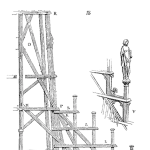
A histogram is a graphical representation of a set of data. It is useful to visually inspect data for its range, distribution, location, scale, skewness, etc. There are many uses for histogram, there you should know how to create one.
Let’s explore a set of data and create default histograms using a variety of methods. If you have a way to create a histogram using some other method or software package please send it over and we’ll add it to the article. [Read more…]












 Ask a question or send along a comment.
Please login to view and use the contact form.
Ask a question or send along a comment.
Please login to view and use the contact form.